The tale of Jehosheba, a biblical heroine, showcases her daring rescue that saved a dynasty, leaving us questioning the depths of her courage.
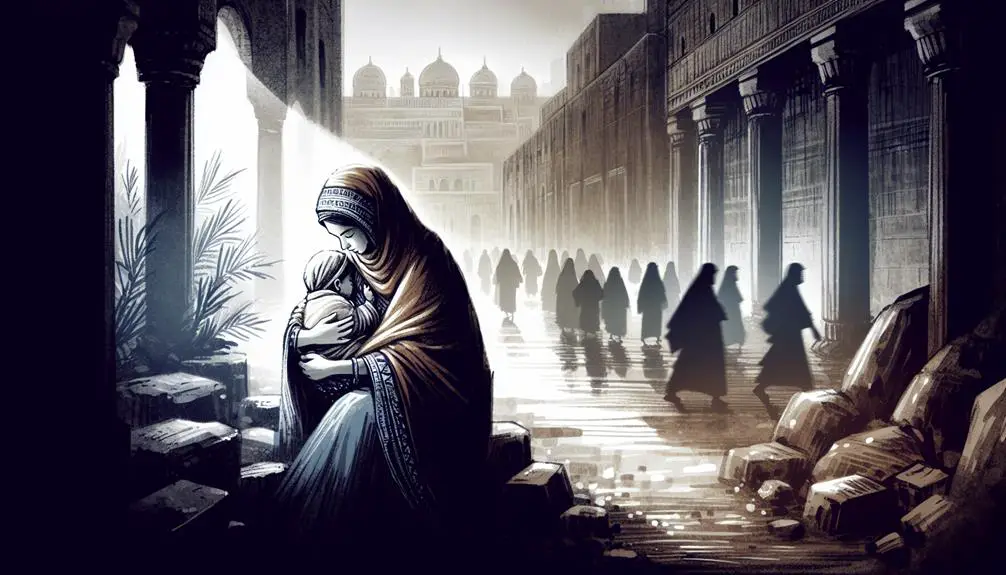
Story of Jehosheba in the Bible
In the ancient tapestry of biblical narratives, the story of Jehosheba stands out not only for its dramatic intensity but also for its profound demonstration of courage and faith. As a princess of the Davidic lineage and an unsung heroine, Jehosheba's decisive actions amidst a violent coup led by Queen Athaliah mark a pivotal moment in the preservation of the Judaic monarchy.
Her audacity to rescue and hide her nephew, Prince Joash, spared the Davidic line from obliteration. This act of bravery, often overshadowed by more prominent biblical figures, raises intriguing questions about the roles of women in biblical histories and their impact on the course of Judeo-Christian legacy.
Unraveling the layers of Jehosheba's story invites a closer examination of the complexities surrounding her character and the circumstances that propelled her into taking such a daring step.
Key Takeaways
- Jehosheba's act saved the Davidic dynasty during a time of political upheaval.
- She was a royal figure who intertwined spiritual and royal authority through her actions.
- Her courage and strategic intervention thwarted Athaliah's plan to eradicate the royal lineage.
- Jehosheba's story highlights the themes of divine preservation and female leadership in the Bible.
The Setting: Jehosheba's Time
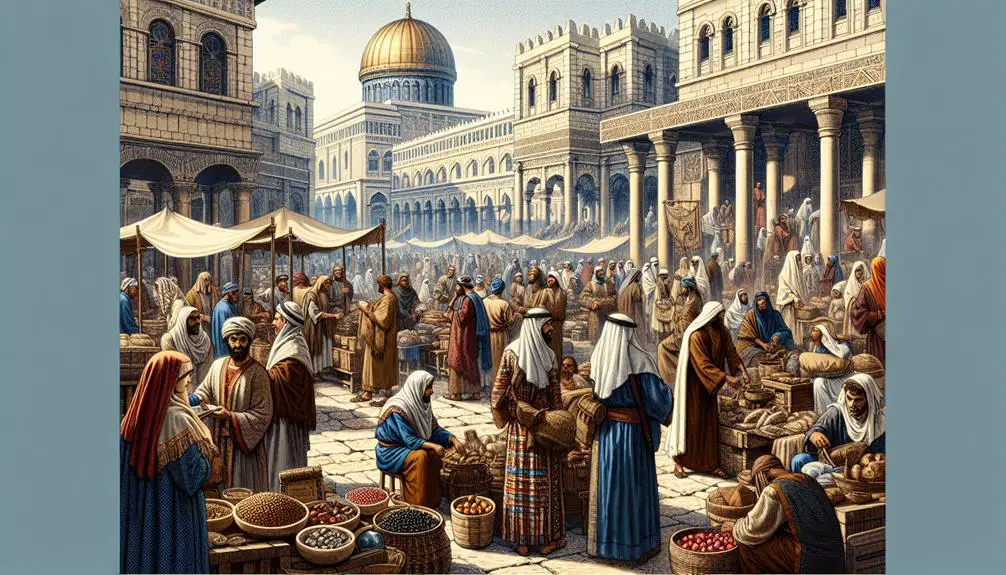
In the fabric of ancient Israel's history, Jehosheba's story unfolds during a tumultuous period marked by political upheaval and dynastic strife, specifically within the context of the 9th century BCE. This era was characterized by frequent conflicts both within the kingdom and with neighboring states, deeply influencing the cultural context and political climate of the time. Jehosheba's narrative, though briefly mentioned, offers a window into the complexities of royal life and the broader societal structures within which she operated.
The 9th century BCE was a period of significant transition for the Israelite kingdoms, with internal divisions and external threats shaping the political landscape. The cultural context of this era was marked by a rich tapestry of religious and social norms that guided daily life and governance. The political climate, on the other hand, was fraught with instability. Israel and Judah, the two Hebrew kingdoms, were often at odds with each other and with neighboring powers, leading to a cycle of alliances and enmities that defined the geopolitics of the region.
Within this setting, the role of royal women like Jehosheba becomes particularly compelling. Their actions, often dictated by the demands of political expediency and familial loyalty, highlight the intricate interplay between personal agency and the overarching structures of power and tradition. Jehosheba's story, set against the backdrop of a volatile political climate and a rich cultural context, provides insight into the challenges and opportunities faced by individuals navigating the complexities of royal identity and responsibility in ancient Israel.
Jehosheba's Royal Lineage
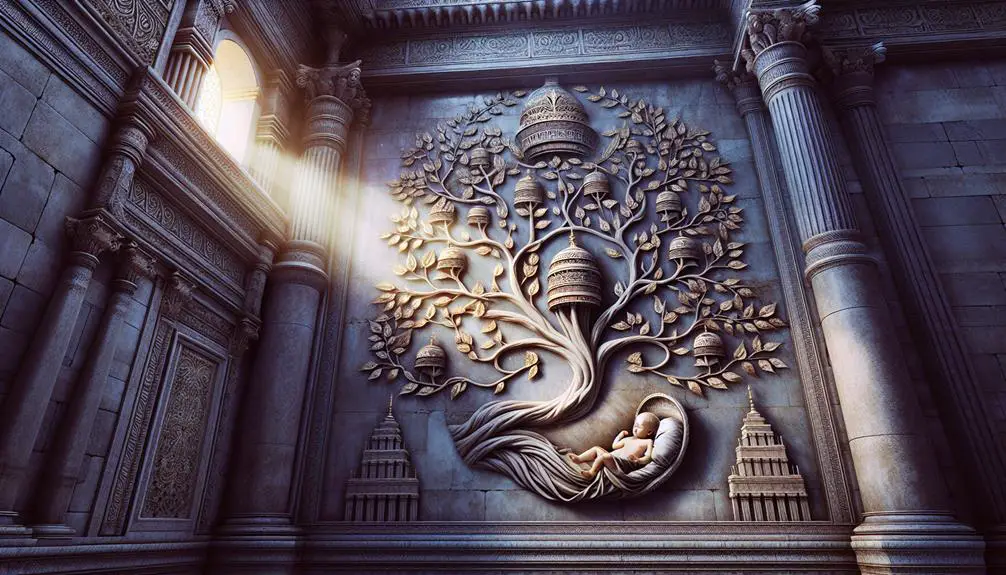
Jehosheba, a figure of noble birth, emerged from the esteemed lineage of King Jehoram of Judah, placing her at the heart of the kingdom's royal family and its intricate political and dynastic narratives. Her genealogy interest scholars and theologians alike, as it connects her to a pivotal period in the Judaic monarchy, where Biblical roles and familial ties intertwine with the fate of the nation. Jehosheba's descent not only signifies her royal status but also frames her actions within the broader context of divine providence and dynastic survival in the Biblical narrative.
Her father, Jehoram, and her mother, Athaliah, daughter of Ahab, king of Israel, illustrate the interconnection between the kingdoms of Judah and Israel, highlighting the complex web of alliances and hostilities that characterized the period. This lineage positioned Jehosheba uniquely, equipping her with insights and affiliations that would later underpin her decisive actions to preserve the Davidic line. Her marriage to Jehoiada, the high priest, further cements her role at the nexus of religious and royal authority, blending hereditary privilege with spiritual leadership.
The exploration of Jehosheba's royal lineage reveals the nuanced interplay between genealogy and destiny in the Biblical account. Her heritage is not merely a backdrop but an active element that informs her character and choices, underscoring the significance of genealogy in understanding Biblical roles. This analysis not only enriches the story of Jehosheba but also contributes to the wider understanding of the social, political, and theological constructs of her time.
The Reign of Athaliah

The reign of Athaliah represents a tumultuous period in Judean history. It is marked by her aggressive seizure of power and the subsequent eradication of the royal lineage. This era highlights the complexities of female rule in a patriarchal society, particularly through Athaliah's ruthless strategies to secure her position on the throne.
Within this context, Jehosheba's courageous act emerges as a pivotal moment. It challenges the prevailing norms and alters the course of Judean leadership.
Athaliah's Usurpation of Power
Athaliah's ascent to power marked a tumultuous period in Judah's history, characterized by her ruthless consolidation of authority and the subsequent eradication of the royal family. Her reign, often seen through the lens of power dynamics and royal intrigue, stands out as a stark example of political maneuvering in the ancient Near East.
By securing her position on the throne, Athaliah disrupted the traditional Davidic lineage, challenging the established norms of succession. Her actions not only reflect the complexities of royal politics but also underscore the fragility of monarchical systems in the face of ambitious individuals.
Athaliah's rule illustrates the intricate interplay between power, ambition, and the lengths to which some will go to secure their position within the annals of history.
Elimination of Royal Heirs
Following her consolidation of power, Athaliah initiated a brutal campaign to eliminate all potential royal heirs, thereby securing her position as ruler of Judah unchallenged. This ruthless move was strategic, ensuring no legitimate claimant could threaten her reign. The implications of this act were far-reaching:
- It disrupted the traditional royal succession, putting the future of the Davidic dynasty at risk.
- It underscored the lengths to which Athaliah would go to maintain power, highlighting her disregard for familial bonds.
- The necessity for heirloom protection became paramount, as surviving members of the royal family were forced into hiding to preserve the lineage.
Athaliah's actions during this period are a stark reminder of the volatility surrounding ancient monarchies and the extreme measures taken to secure power.
Jehosheba's Courageous Act
In the midst of Athaliah's ruthless purge of the royal lineage, Jehosheba, a lesser-known but pivotal figure, executed a daring maneuver that would ultimately preserve the Davidic dynasty.
Her actions, marked by hidden motives and protective strategies, illuminate her pivotal role in the biblical narrative. Jehosheba's decision to hide Joash, the sole surviving heir, from Athaliah's murderous intent was not merely an act of defiance but a strategic move steeped in foresight and understanding of the broader implications for their faith and nation.
This act of courage underscores the complexity of her character, revealing a depth of commitment to her family and faith. Jehosheba's intervention, therefore, was not only a rescue of an individual but a safeguarding of the theological and royal continuity in a time of crisis.
The Massacre of the Royal Family
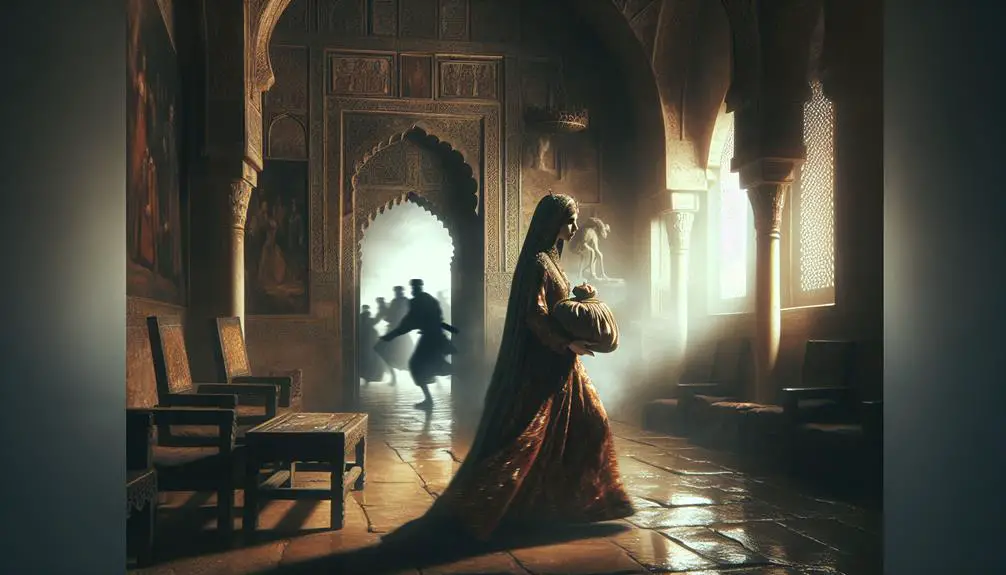
Amidst a grim chapter of Judean history, the massacre of the royal family marked a critical juncture, orchestrated by Athaliah in a ruthless bid to consolidate her hold on the throne. This event, steeped in royal motivations and political intrigue, reflects the tumultuous nature of monarchic successions in the ancient Near East. The drive for power often led to brutal outcomes, with Athaliah's actions being a stark example of the lengths to which individuals would go to secure their position and authority.
The massacre not only decimated the royal lineage but also sent shockwaves through the sociopolitical fabric of Judea. This act of treachery was not an isolated incident but a manifestation of the broader struggles for power that characterized the period. Several key factors contributed to the dynamics of this event:
- Royal motivations: The desire to eliminate any rivals to the throne was a common motivation behind such acts, reflecting the precarious nature of royal succession.
- Political intrigue: The court of Judea was rife with intrigue, alliances, and betrayals, making the massacre a calculated political move as much as a personal vendetta.
- Power consolidation: By eliminating potential claimants to the throne, Athaliah aimed to solidify her rule and deter any opposition, highlighting the brutal realities of political power in ancient monarchies.
The massacre of the royal family underlines the harsh realities of ancient royal politics, where personal ambition and the quest for power often resulted in bloodshed and tragedy.
Jehosheba's Courageous Act

Despite the pervasive atmosphere of treachery and despair that followed the massacre of the royal family, Jehosheba's daring intervention emerged as a beacon of hope and resilience. Her actions, driven by hidden motivations, positioned her among the most courageous of biblical heroines. Jehosheba's audacity in the face of widespread bloodshed not only highlights her valor but also underscores the complex interplay of personal conviction and political savvy.
In a period marked by ruthless power struggles, Jehosheba's decision to act transcended mere familial loyalty. Her motivations, though not explicitly detailed in the biblical narrative, can be inferred to stem from a profound sense of justice and a commitment to preserving the Davidic line. This interpretive analysis allows us to appreciate the depth of Jehosheba's character and the strategic thinking that informed her actions.
Moreover, Jehosheba's initiative serves as a pivotal moment in the biblical account, redirecting the course of Judean history. Her courage underlines the significant yet often overlooked role of women in the preservation and continuation of dynastic legacies. By examining Jehosheba's act through the lens of hidden motivations, scholars can gain insights into the nuanced dynamics of power, faith, and gender in biblical narratives.
Hiding Prince Joash
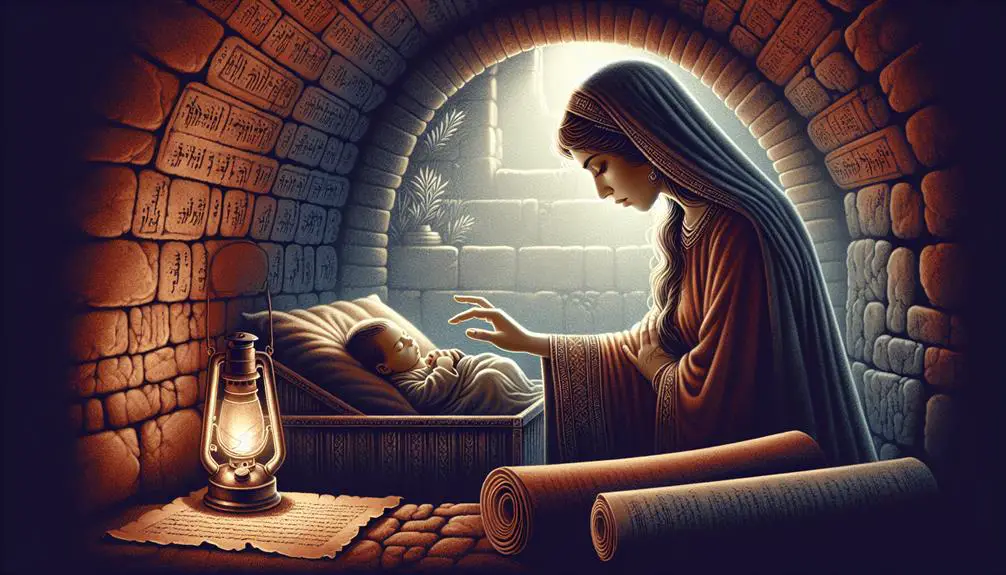
Building on her demonstrated courage and strategic thinking, Jehosheba undertook the critical task of hiding Prince Joash, thereby ensuring the survival of the Davidic line amidst a period of unprecedented peril. This act was not merely about finding a temporary refuge; it was a strategic move that involved intricate planning and the establishment of a secret sanctuary for the young prince. Jehosheba's actions can be analyzed through various lenses, highlighting her role in the covert operations that were pivotal during this tumultuous time.
The preservation of Prince Joash involved several key elements:
- Securing a Secret Sanctuary: Jehosheba utilized her connections and knowledge of the palace to identify a safe location that would serve as a hidden refuge for Joash. This secret sanctuary was crucial in eluding the forces that sought to eradicate the royal lineage.
- Forming a Trusted Network: The success of such covert operations relied heavily on a small, trusted circle of individuals who could carry out the necessary tasks without betraying their intentions. Jehosheba's ability to organize and maintain this network was instrumental in keeping Joash safe.
- Implementing Security Measures: Beyond finding a hiding place, Jehosheba had to ensure that ongoing security measures were in place to protect the young prince. This involved constant vigilance and possibly relocating the secret sanctuary to avoid detection.
The Overthrow of Athaliah

Turning our attention to the overthrow of Athaliah, it is essential to understand the complex dynamics that led to her seizure of power, a move that reshaped the course of Judean history.
Jehosheba's audacious rescue of Prince Joash not only thwarted Athaliah's attempt to eradicate the Davidic line but also set the stage for the latter's eventual downfall and death.
This sequence of events underscores the pivotal moments of political intrigue and divine intervention in the narrative, highlighting the fragile balance of power within the ancient monarchy.
Athaliah's Usurpation of Power
Athaliah's usurpation of power marks a tumultuous period in Judean history, characterized by her ascension to the throne following the death of her son, King Ahaziah. Her reign is notably marked by:
- Political intrigue: Athaliah's rise to power involved complex political maneuvers and alliances, particularly with those who were loyal to her familial ties to the Omride dynasty.
- Religious reforms: She promoted the worship of Baal, leading to significant religious shifts and tensions within Judea.
- A climate of fear: Her attempt to secure her position involved the elimination of potential rivals, contributing to a period of instability and fear.
Athaliah's rule, thus, represents a critical juncture in the narrative of Judean kingship, intertwining political, religious, and social upheavals.
Jehosheba's Courageous Rescue
In the shadow of Athaliah's tyrannical reign, Jehosheba, a lesser-known yet pivotal figure, executed a daring rescue that would alter the course of Judean history. Her actions, steeped in both historical accuracy and religious interpretations, underscore the complex interplay between faith and politics in ancient Judea.
Jehosheba's decision to hide Joash, the rightful heir to the throne, from Athaliah's murderous purge, not only preserved the Davidic line but also set the stage for the eventual overthrow of Athaliah. This singular act of courage reflects the nuanced readings of biblical narratives, where individual agency often intersects with divine providence.
Scholars emphasize her bravery as emblematic of the broader themes of resistance and survival that are prevalent throughout religious texts.
Athaliah's Downfall and Death
Following Jehosheba's courageous actions, the stage was set for the dramatic overthrow and subsequent demise of Athaliah, an event that would decisively end her reign of terror over Judea. This pivotal moment is rooted in an intricate interplay of factors, notably:
- Athaliah's religion: Her fervent advocacy for Baal worship alienated the Judean populace, fostering widespread discontent.
- Political alliances: Her foreign alliances, particularly with Baal-worshipping factions, further estranged her from Judean society, undermining her support base.
- Public sentiment: The cumulative effect of Athaliah's religious and political maneuvers led to an erosion of public trust and loyalty, setting the stage for her ultimate downfall.
These elements collectively facilitated the overthrow of Athaliah, marking a significant turning point in Judean history.
Jehosheba's Legacy

Jehosheba's enduring legacy within the biblical narrative is primarily characterized by her courageous act of preserving the Davidic line during a period of significant turmoil. Her story, while briefly mentioned, marks a pivotal moment that ensured the continuation of a lineage that is central to both the historical and theological framework of the Judeo-Christian tradition. Jehosheba's actions are not merely an act of defiance against a tyrannical ruler but are emblematic of divine providence and the preservation of a covenantal promise.
Modern interpretations of Jehosheba's role have expanded to appreciate her genealogical significance and her exemplification of faith and bravery. Her story is analyzed not just for its historical context but for its lasting implications on the understanding of female agency in biblical times.
Aspect |
Significance |
|---|---|
Genealogical Impact |
Jehosheba's intervention ensured the survival of the Davidic line, crucial for Messianic prophecies. |
Symbol of Courage |
Her actions are a testament to faith and bravery amidst life-threatening danger. |
Theological Insight |
Jehosheba's story underscores the theme of divine preservation and fulfillment of promises. |
Feminine Agency |
Represents a significant instance of female initiative and leadership in the biblical narrative. |
In scholarly discourse, Jehosheba's narrative is revisited not only for its historical and theological implications but also for its contribution to discussions on gender roles within the scriptures. Her legacy, therefore, transcends the immediate context of her actions, influencing modern interpretations of biblical heroism and the complexities of genealogical significance within the scriptural canon.
Frequently Asked Questions
How Has Jehosheba's Story Influenced Modern Christian Practices and Beliefs?
Jehosheba's legacy has significantly influenced modern Christian practices and beliefs, particularly through its incorporation into modern sermons. Preachers often cite her courageous actions as emblematic of divine intervention and faithfulness amidst adversity. This narrative serves not only as a moral compass but also as a theological underpinning that emphasizes God's providence and the importance of righteousness.
Consequently, Jehosheba's story continues to inspire and shape contemporary Christian discourse and ethical considerations.
Are There Any Archaeological Findings That Directly Support Jehosheba's Historical Existence or Her Actions as Recorded in the Bible?
Despite diligent excavations and scholarly research, there are currently no archaeological findings or artifacts directly linked to Jehosheba or her narrative actions as described in biblical texts.
While the quest for tangible evidence continues, the absence of specific Jehosheba artifacts does not diminish the cultural or religious significance of her story. Instead, it underscores the challenges inherent in corroborating ancient texts with physical excavation insights, a pursuit that remains vital yet elusive in biblical archaeology.
How Is Jehosheba Represented or Referenced in Other Religious Texts Outside of the Bible?
In the realm of interfaith dialogues and comparative theology, Jehosheba's representation in texts outside the Bible is notably sparse. While her story is rooted within the Judeo-Christian tradition, exploration into her presence or reference in other religious scriptures is limited. This absence underscores the specificity of her narrative to the Biblical context and invites further scholarly investigation into the cross-cultural transmission of religious figures and their stories across diverse theological landscapes.
What Are the Psychological Analyses or Interpretations of Jehosheba's Motives and Actions From a Contemporary Perspective?
From a contemporary psychological perspective, Jehosheba's actions can be analyzed through the lens of 'heroic empathy' and 'maternal instincts.' While not everyone might secretly harbor royal-saving inclinations, her story intriguingly mirrors the extremes of human empathy and protective instincts.
Her motives, often shrouded in ancient texts, reveal a complex interplay of psychological factors. Such analysis not only enriches our understanding of historical figures but also offers insights into the universal aspects of human behavior.
How Has Jehosheba's Story Been Portrayed in Art, Music, or Literature Throughout History?
Jehosheba's narrative has been a source of inspiration across various artistic domains, albeit not as extensively as other biblical figures. In opera and classical music, her story occasionally surfaces, often imbued with religious symbolism to highlight themes of salvation and divine intervention.
Literature and visual arts have similarly interpreted her actions, yet the portrayals remain relatively scarce, suggesting a nuanced exploration of her legacy within the broader tapestry of religious and historical storytelling.
Conclusion
In conclusion, the narrative of Jehosheba emerges as a beacon of bravery amidst the tempestuous seas of Judean history. Her audacious rescue of Prince Joash not only thwarted the complete annihilation of David's lineage but also preserved the Judaic monarchy from the clutches of oblivion.
This act of valor, enshrined within the annals of Biblical lore, underscores the profound impact of individual courage on the tapestry of collective destiny, leaving an indelible legacy that transcends generations.



Sign up